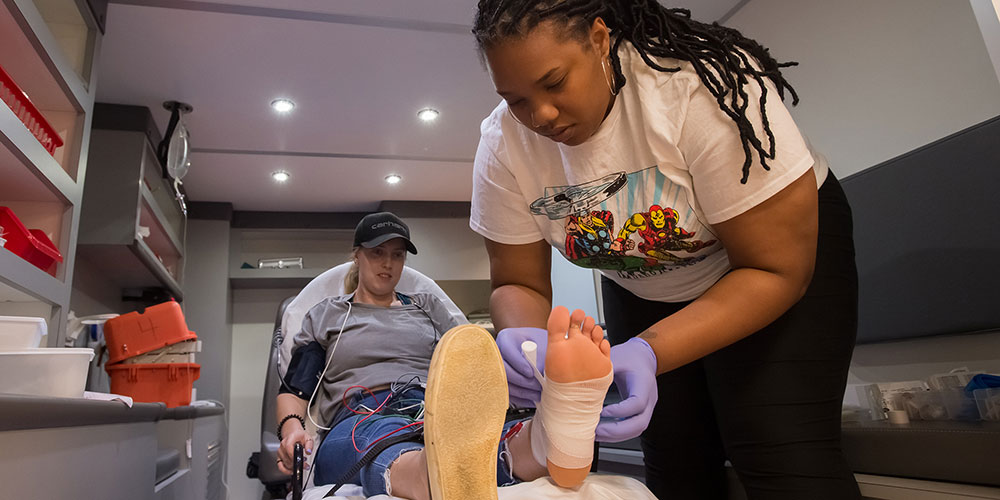ECC Strengthens Emergency Services Training

Cadet Tramika Cason wraps Cadet Hannah Alcock’s ankle as if it were broken during a lab in Edgecombe Community College’s Paramedic program. The college offers a new program that enables paramedics to earn an associate degree in Emergency Medical Science.
The state of North Carolina is considering a proposal that would require a two-year associate degree for new paramedics, and Edgecombe Community College is working to be prepared for the likelihood of new regulations.
The college recently launched a program that enables students to earn an associate degree in Emergency Medical Science.
“What makes this program important and unique is that it improves a student’s ability to document incidents,” explains Adam Culbertson, fire and EMS coordinator at ECC. “They learn better writing skills and better math skills.
“Our goal is to provide supplementary education for paramedics.”
The N.C. Office of Emergency Medical Services proposal, if passed, would impact only paramedic applicants who apply for credentials after July 1, 2023. Current paramedics would not be required to earn an associate degree to maintain their credentials.
Culbertson says paramedics who are equipped with strong writing and math skills will have improved outcomes at work.
“If they do a better job of documenting reports, insurance claims will be disputed less often,” he explains. “With better math skills, fewer mistakes will be made with medication.”
Culbertson began his career in emergency medical services as an EMT in 1999 and earned his paramedic certification in 2005. He joined ECC as an instructor in 2012 and taught at the college for five years. In 2021, he returned to coordinate the fire and EMS program.
“The biggest challenge with the proposal to require paramedics to earn an associate degree has been with the agencies, getting them to see the value of more education,” he says. “I get it because I’ve been in their shoes, but the additional training will definitely strengthen their ability to serve the public.”
Edgecombe Community College’s new degree program is set up a little differently than other local programs, Culbertson says, and allows students greater flexibility.
“We’re the only college in the area that I know of that offers classes in an eight-week format instead of the typical 16 weeks,” he says. “This enables students to take more classes in a semester.”
In addition to general college classes, students enrolled in the new associate degree program take two EMS classes. One is an advanced skills course. The second is either a management class for future administrators or a methodology class designed for instructors.
In addition to helping paramedics perform better, Culbertson believes requiring paramedics to earn an associate degree could lead to increased compensation.
“EMS providers aren’t paid the best in the world,” he says. “But there’s a push to turn that around. Getting a degree could be the push that earns them the pay they deserve.”
Paramedics in North Carolina earn an average of about $20 an hour, less in rural areas like Edgecombe County. Some agencies in the state pay EMTs about $10 an hour.
Culbertson is on a mission to get more EMT and paramedic students at Edgecombe Community College. His vision for that centers on a degree program that starts with basic EMT training and ends five semesters later with students graduating as a paramedic with an associate degree.
“You don’t have to work on an ambulance,” Culbertson explains. “I’ve worked NASCAR events, basketball games, and concerts. Starting out as an EMT is a gateway to being a paramedic and so much more.”
Short-term training programs in EMT, AEMT, and Medical Responder begin in August. Financial assistance is available to qualified students. To learn more about these programs and the Emergency Medical Science degree, please contact Adam Culbertson at (252) 618-6616.
